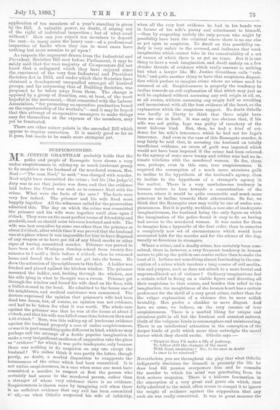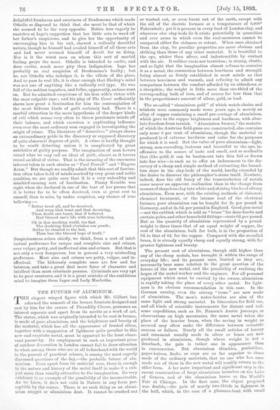SUSPICIOUSNESS.
MR. JUSTICE GRANTHAM probably holds that the police and people of Ramsgate have shown a very undue suspiciousness in raking-up so much irrelevant gossip to fix suspicion on the husband of the murdered woman, Mrs. Noel :—" The man Noel," he said, " was charged with murder. Noel might have committed the crime ; but his [the judge's] duty was to see that justice was done, and that the evidence laid before the Court was such as to connect Noel with the crime. What were the facts of the case P The facts were very few indeed. The prisoner and his wife lived most happily together. All the witnesses called for the prosecution admitted this. The day on which the crime was committed the prisoner and his wife were together until close upon 2 o'clock. They were on the most perfect terms of friendship and goodwill, such as should exist between husband and wife, The wife was last seen alive by some one other than the prisoner at about 2 o'clock, after which time it was proved that the husband was at a place where it was impossible for him to have disposed of any weapon or to have got rid of any blood marks or other signs of having committed murder. Prisoner was proved to have been at the Wesleyan Sunday-school from twenty-five minutes to 3 until a little before 4 o'clocrr, when he returned home and found that he could not get into the house. He drew the attention of his neighbours to this fact. A ladder was fetched and placed agitinst the kitchen window. The prisoner mounted the ladder, and, looking through the window, saw his wife lying in what he thought was a swoon. Prisoner got through the window and found his wife dead on the floor, with a bullet-wound in the head. He admitted to the house one of his neighbours, and medical assistance was summoned. The doctors expressed the opinion that prisoner's wife had been dead two hours, but, of course, an opinion was not evidence, and had to be taken for what it was worth. The whole case against the prisoner was that he was at the house at about 2 o'clock, and that his wife was killed some time between then and 4.40 o'clock." Now, WAS this raking-up of irrelevant evidence against the husband properly a case of undue suspiciousness, or was it in part something quite different in kind, which we may perhaps call the attempt of a feeble popular imagination to make a very insignificant modicum of suggestion take the place as " evidence " for which it was quite inadequate, only because there was nothing to fix suspicion on any one except the husband P We rather think it was partly the latter, though partly, no doubt, a morbid disposition to exaggerate the heinousness of the crime which had been committed. It is not undue suspiciousness, in a case when some one must have committed a murder, to suspect at first the person who certainly had access to the murdered person, rather than a stranger of whose very existence there is no evidence. Suspiciousness is 'shown more by imagining evil when there is no sufficient evidence that any evil has been committed at. all,—as when Othello suspected his wife of infidelity, when all the very best evidence he had in his hands was in favour of his wife's parity and attachment to himself, —than by suspecting unduly the only person who might by possibility have been the criminal where there is no one else as yet open to suspicion. To dwell on this possibility un- duly is very unfair to the accused, and indicates that weak imagination which cannot take in the conceivability of a set of causes of which there is as yet no trace. But it is one thing to have a weak imagination, and dwell unduly on a few slender threads of evidence which really amount to nothing but what a lawyer like Mr. Justice Grantham calls "rub- bish," and quite another thing to have that suspicious disposi- tion which prefers to imagine crime where no crime need be assumed at all. Suspiciousness is properly the tendency to incline towards an evil explanation of that which may just as well be explained without assuming any evil origin at all, or, at all events, without assuming any origin half so revolting and inconsistent with all the best evidence 'of the heart, as the explanation which the suspicious suggest. No doubt Othello was hardly at liberty to think that there might have been no one in fault. It was only too obvious that, if his wife was not guilty, Iago was guilty of treachery of the most hideous kind. But, then, he had a kind of evi- dence for his wife's innocence, which he had not for Iago's innocence. And even in the case of this Ramsgate murder, it may fairly be said that, in accusing the husband on totally insufficient evidence, an excess of guilt was imputed which would not have been imputed if the crime had been referred to the agency of some mere tramp and robber who had no in- timate relations with the murdered woman. So far, there was, perhaps, even in this case, true suspiciousness. It required the assumption of a much more atrocious guilt to incline to the hypothesis of the husband's agency, than to incline to the hypothesis of a stranger's agency, in the matter. There is a very unwholesome tendency in human nature to lean towards a concentration of the horrors, where it would be quite reasonable and much more generops to incline towards their attenuation. So far, we think that the Ramsgate case may really be one of undue sus- piciousness. But it is partly, we think, a case also of inadequate imaginativeness, the husband being the only figure on which the imagination of the police found it easy to fix as having had access to the murdered woman. It was easier for them to imagine him a hypocrite of the first order, than to conceive a completely new set of circumstances which would have accounted both for the murder and for the silence of the dog, usually so ferocious to strangers.
Where a crime, and a deadly crime, has certainly been com- mitted, there is, however, a very frequent tendency in human nature to pile up the guilt in one centre rather than to make the least of it. Is there not something almost fascinating in the con- ception of a crime which involves a long course of evil medita- tion and purpose, such as does not attach to a mere brutal and unpremeditated act of violence P Ordinary imaginations feel a certain relief in fixing on a visible figure and directing all their suspicions to that centre, and besides this relief to the imagination, the naughtiness of the human heart has a certain preference for the thrill of a very great crime, rather than for the vulgar explanation of a violence due to mere selfish brutality. Men prefer a shudder to mere disgust. And here we come, we believe, on the very essence of true suspiciousness. There is a morbid liking for unique and atrocious guilt in all but the frankest and sunniest natures. Guilt of the vulgarer kinds is commonplace and uninteresting. There is an intellectual attraction in the conception of the deeper kinds of guilt which more than outweighs the moral horror which they should excite. Othello says :- " Think'st thou I'd make a life of jealousy, To follow still the changes of the moon With fresh suspicions P No; to be once in doubt Is once to be resolved."
Nevertheless, you see throughout the play that what Othello indignantly disclaims for himself, is precisely the life he does lead till passion overpowers him and he commits the murder to which his mind was gravitating from its first serious suspicion. There is a hideous fascination in the conception of a very great and grave sin which, once fully admitted to the mind, often seems to compel it to ignore the weight of evidence against the supposition that any such sin was really committed. It was in great measure the delightful frankness and sweetness of Desdemona which made Othello so disposed to think that she must be that of which she seemed to be the very opposite. Notice bow eagerly he snatches at lago's suggestion that her little arts to ward off her father's suspicions, and to give her the opportunity of encouraging him in his suit, showed a radically deceitful nature, though he himself had availed himself of all these arts and had never accused himself of deceit for so doing.
Nor is it the worst men on whom this sort of morbid feeling preys the most. Othello is intended to excite, and does excite, much more pity than indignation. Togo has probably no real suspicion of Desdemona's frailty ; but he, not Othello who indulges it, is the villain of the piece. And to pass to real life, it is clear enough that Shelley's mind was not one of anything like a radically evil type. He was full of the noblest impulses, and fuller, apparently, as time went on. But he admitted suspicions of his first wife's virtue with the most culpable esise ; and his play of The Cenci sufficiently shows how great it fascination for him the contemplation of the most hideous kinds of guilt certainly had. There is a morbid attraction in the mere hypothesis of the deeper kinds of evil which seems very often to throw passionate minds off their balance, and which exercises a captivating influence even over the most ordinary men engaged in investigating the origin of crime. The literature of " detectives " always shows an extraordinary pride in the discovery or supposed discovery of quite abnormal degrees of guilt. A crime is hardly thought to be worth detecting unless it is complicated by great subtleties of guilty purpose. The imagination of man hovers round what we may call an ideal of guilt, almost as it hovers round an ideal of virtue. That is the meaning of the enormous interest taken in such stories as "Paul Ferroll" and "Eugene Aram." But though we readily admit that this sort of fascina- tion often takes hold of minds marked by very great and noble qualities, we are quite sure that it is a very unhealthy and mischief-causing sort of fascination. Fanny Remble was right when she declared in one of the best of her poems that it is better far to be often deceived, even at great cost to oneself, than to miss, by undue suspicion, any chance of true believing :— " Better trust all, and be deceived,
And weep that trust and that deceiving, Than doubt one heart, that if believed Had blessed one's life with true believing.
Oh in this mocking world, too fast The doubting fiend o'ertakes our youth ; Better be cheated to the last, Than lose the blessed hopo of truth."
Suspiciousness arises chiefly, we think, from a sort of intel- lectual preference for unique and complete sins and crimes, over vulgar, petty, and ineffectual sins and crimes. But that is not only a very dangerous, but in general a very misleading preference. Most sins and crimes are petty, vulgar, and in- effectual. The hideously complete ones are few and far between, and take a great deal more force of character and intellect than most criminals possess. Criminals are very apt to be poor creatures, and it is a great mistake of the ambitious mind to imagine them Iagos and Lady Macbeths.



































 Previous page
Previous page